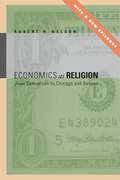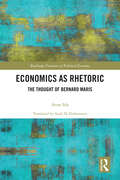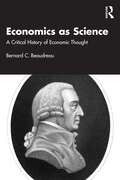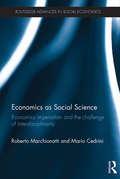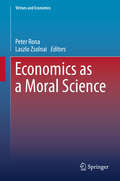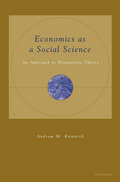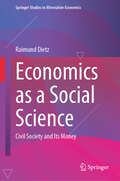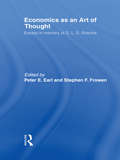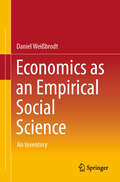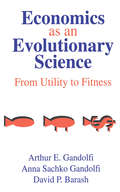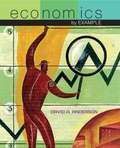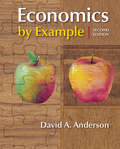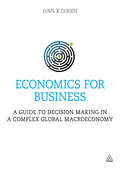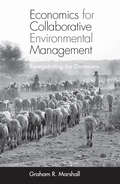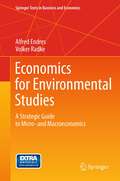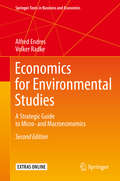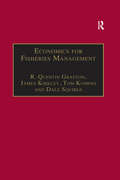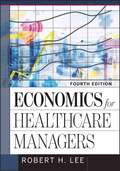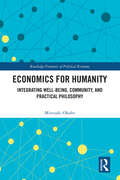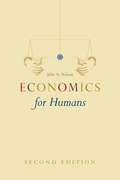- Table View
- List View
Economics as Religion: From Samuelson to Chicago and Beyond
by Robert H. NelsonRobert Nelson’s Reaching for Heaven on Earth, Economics as Religion, and The New Holy Wars: Economic Religion Versus Environmental Religion in Contemporary America read almost like a trilogy, exploring and charting the boundaries of theology and economics from the Western foundations of ancient Greece through the traditions that Nelson identifies as “Protestant” and “Roman,” and on into modern economic forms such as Marxism and capitalism, as well as environmentalism. Nelson argues that economics can be a genuine form of religion and that it should inform our understanding of the religious developments of our times. This edition of Economics as Religion situates the influence of his work in the scholarly economic and theological conversations of today and reflects on the state of the economics profession and the potential implications for theology, economics, and other social sciences.
Economics as Rhetoric: The Thought of Bernard Maris (Routledge Frontiers of Political Economy)
by Anne IslaBernard Maris was killed in Paris on January 7, 2015, during the terrorist attack against the satirical magazine Charlie Hebdo. He remains one of the most original intellectuals of contemporary France, but despite being a uniquely original heterodox thinker, his international reputation has been compromised by the fact that his writings are inaccessible to non-French speakers. This book remedies that.By providing an overview of Bernard Maris’ life and intellectual trajectory as well as an English translation of an anthology of his most relevant writings, this volume provides the international audience – for the first time ever – the chance to know and understand the contribution of this major heterodox economist. An outstanding and atypical figure in economic thought and a virulent critic of mainstream dominant economics, he was also an all-round actor and thinker of his time. Through rigorous reasoning, he questioned the notion of well-being, which, he argued, is too often conflated with having more. Enslavement by work, or the endless destructive accumulation of natural wealth, is also inherent to the capitalist system. Probably his most original contribution is his epistemological reflection on the very nature of economics and his appraisal of this discipline as a form of rhetoric.This book will be of great interest to readers in heterodox economics, economic methodology, epistemology, and French literature and culture more broadly.
Economics as Science: A Critical History of Economic Thought
by Bernard C. BeaudreauThis book provides a critical approach to the study of economic thought – from neoclassical economics, to Marxian economics, and to Keynesian economics – through the lens of science and the scientific method.It examines the collection of ideas that constitute the core of economic thought in the five basic fields of economics: growth theory, income distribution, macroeconomics, price theory and international trade. In each of these, the analysis is chronological, detailing the various events and developments that led scholars to inquire into the underlying mechanics of the phenomena in question. This is followed by a critical examination of the various scholarly contributions, including those of Nobel Prize laureates, in terms of their scientific merit. Each of the five core chapters begins with a listing of chapter objectives and ends with a summary, as well as discussion questions to encourage debate. Short excerpts from the key works are provided to allow the reader first-hand exposure to primary sources.Reinforcing the idea that economics is a scientific endeavor, Economics as Science: A Critical History of Economic Thought sets out to demonstrate the relevance of the tools and techniques students of economics acquire during their studies in understanding economic phenomena throughout the ages. It will be an invaluable resource for students of the history of economic thought and economics more generally.
Economics as Social Science: Economics imperialism and the challenge of interdisciplinarity (Routledge Advances in Social Economics)
by Roberto Marchionatti Mario CedriniThere is a growing consensus in social sciences that there is a need for interdisciplinary research on the complexity of human behavior. At an age of crisis for both the economy and economic theory, economics is called upon to fruitfully cooperate with contiguous social disciplines. The term ‘economics imperialism’ refers to the expansion of economics to territories that lie outside the traditional domain of the discipline. Its critics argue that in starting with the assumption of maximizing behaviour, economics excludes the nuances of rival disciplines and has problems in interpreting real-world phenomena. This book focuses on a territory that persists to be largely intractable using the postulates of economics: that of primitive societies. In retracing the origins of economics imperialism back to the birth of the discipline, this volume argues that it offers a reductionist interpretation that is poor in interpretative power. By engaging with the neglected traditions of sociological and anthropological studies, the analysis offers suggestions for a more democratic cooperation between the social sciences. Economics as Social Science is of great interest to those who study history of economic thought, political economy and the history of economic anthropology, as well as history of social sciences and economic methodology.
Economics as a Moral Science
by Laszlo Zsolnai Peter RonaThe book is reclaiming economics as a moral science. It argues that ethics is a relevant and inseparable aspect of all levels of economic activity, from individual and organizational to societal and global. Taking ethical considerations into account is needed in explaining and predicting the behavior of economic agents as well as in evaluating and designing economic policies and mechanisms. The unique feature of the book is that it not only analyzes ethics and economics on an abstract level, but puts behavioral, institutional and systemic issues together for a robust and human view of economic functioning. It sees economic "facts" as interwoven with human intentionality and ethical content, a domain where utility calculations and moral considerations co-determine the behavior of economic agents and the outcomes of their activities. The book employs the personalist approach that sees human persons - endowed with free will and conscience - as the basic agents of economic life and defines human flourishing as the final end of economic activities. The book demonstrates that economics can gain a lot in meaning and also in analytical power by reuniting itself with ethics.
Economics as a Moral Science (Virtues and Economics #1)
by Laszlo Zsolnai Peter RonaThe book is reclaiming economics as a moral science. It argues that ethics is a relevant and inseparable aspect of all levels of economic activity, from individual and organizational to societal and global. Taking ethical considerations into account is needed in explaining and predicting the behavior of economic agents as well as in evaluating and designing economic policies and mechanisms. The unique feature of the book is that it not only analyzes ethics and economics on an abstract level, but puts behavioral, institutional and systemic issues together for a robust and human view of economic functioning. It sees economic “facts” as interwoven with human intentionality and ethical content, a domain where utility calculations and moral considerations co-determine the behavior of economic agents and the outcomes of their activities. The book employs the personalist approach that sees human persons – endowed with free will and conscience – as the basic agents of economic life and defines human flourishing as the final end of economic activities. The book demonstrates that economics can gain a lot in meaning and also in analytical power by reuniting itself with ethics.
Economics as a Social Science
by Andrew M. KamarckEconomics as a Social Scienceis a highly readable critique of economic theory, based on a wide range of research, that endeavors to restore economics to its proper role as a social science. Contrary to conventional economic theory, which assumes that people have no free will, this book instead bases economics on the realistic assumption that human beings can choose; that we are complex beings affected by emotion, custom, habit, and reason; and that our behavior varies with circumstances and times. It embraces the findings of history, psychology, and other social sciences and the insights from great literature on human behavior as opposed to the rigidity set by mathematical axioms that define how economics is understood and practiced today. Andrew M. Kamarck demonstrates that only rough accuracy is attainable in economic measurement, and that understanding an economy requires knowledge from other disciplines. The canonical hypotheses of economics (perfect rationality, self-interest, equilibrium) are shown to be inadequate (and in the case of "equilibrium" to be counterproductive to understanding the forces that dominate the economy), and more satisfactory assumptions provided. The market is shown to work imperfectly and to require appropriate institutions to perform its function reasonably well. Further, Kamarck argues that self-interest does not always lead to helping the general interest. Economics as a Social Scienceexamines and revises the fundamental assumptions of economics. Because it avoids jargon and explains terms carefully, it will be of interest to economics majors as well as to graduate students of economics and other social sciences, and social scientists working in government and the private sector. Andrew M. Kamarck is former Director, Economic Development Institute, the World Bank.
Economics as a Social Science: Civil Society and Its Money (Springer Studies in Alternative Economics)
by Raimund DietzThis book explores the separation of economics from the social sciences. Raimund Dietz attributes this development to the adoption of a too narrow, instrumentalist perspective and demonstrates how close the mainstream is to the idea of a socialist planned economy, despite all its liberal phraseology. The book attempts to comprehensively reconstruct economics as catallactics, explicitly including and assigning a central role to liberal forms of socialization, such as exchange and money – an approach that, it argues, is the only way to overcome the methodological deficits of the mainstream. It allows monetary theory to be integrated into economic theory. Further, the book shows that modern societies have no choice but to organize themselves as capitalist market economies. For good economic reasons, money has lost its physical value over the course of time and is now merely symbolic. As a result, the importance of the state has also grown. The author proposes that the power to create money should be consistently placed in the hands of the central bank. The book offers a transformative perspective that addresses the urgent need for sustainable resource management worldwide. It invites social scientists, policymakers, and especially economists to rethink economics and pursue a holistic approach to a more sustainable future.
Economics as an Art of Thought: Essays in Memory of G.L.S. Shackle (Routledge Studies in the History of Economics)
by Peter E. Earl Stephen F. FrowenThis volume unites scholars from all over the world, and with very different theoretical perspectives. Their chapters probe into typical Shacklean themes of time and money, uncertainty and expectation, and into the roots of G.L.S. Shackle's philosophical and methodological stance.
Economics as an Empirical Social Science: An Inventory
by Daniel WeißbrodtEconomics still adheres entirely unreflectively to a mechanistic worldview and machine thinking. Epistemologically, it thus remains in the 19th century, and its assumptions and theories, methods, and models therefore stand in stark contradiction to the findings of all other social and natural sciences as well as a multitude of empirical facts. Through a discourse-analytical examination of sixteen basic concepts in economics, based on twelve standard economics textbooks, their ideahistorical origin and use are worked out and compared and related to the current state of knowledge of other disciplines. This reveals the structural, methodological, and content errors of economics in a clear manner. Especially for critical students, who have long been demanding an economics that is in line with the current state of research and faces the challenges of the 21st century, this opens up the possibility of a new approach to economics. The Content Discourse-analytical examination of fundamental assumptions and concepts of economics from "labor" to "wealth" Structural, methodological, and content critique of economic thinking from an epistemological perspective Critical examination of the use of empirical and statistical data, the method of gaining knowledge, and the model thinking in economics
Economics as an Evolutionary Science: From Utility to Fitness
by Anna Sachko GandolfiEconomics is traditionally taken to be the social science concerned with the production, consumption, exchange, and distribution of wealth and commodities. Economists carefully track the comings and goings of the human household, whether written small (microeconomics) or large (macroeconomics) and attempt to predict future patterns under different situations. However, in constructing their models of economic behavior, economists often lose sight of the actual characteristics and motivations of their human subjects. In consequence, they have found the goal of an explanatory and predictive science to be elusive. Economics as an Evolutionary Science reorients economics toward a more direct appreciation of human nature, with an emphasis on what we have learned from recent advances in evolutionary science. The authors integrate economics and evolution to produce a social science that is rigorous, internally coherent, testable, and consistent with the natural sciences. The authors suggest an expanded definition of "fitness," as in Darwin's survival of the fittest, emphasizing not only the importance of reproduction and the quality of offspring, but also the unique ability of humans to provide material wealth to their children. The book offers a coherent explanation for the recent decline in fertility, which is shown to be consistent with the evolutionary goal of maximizing genetic success. In addition, the authors demonstrate the relevance to economics of several core concepts derived from biologists, including the genetics of parent-offspring conflict, inclusive fitness theory, and the phenomena of R-selection and K-selection. The keystone of their presentation is a cogent critique of the traditional concept of "utility." As the authors demonstrate, the concept can be modified to reflect the fundamental evolutionary principle whereby living things-including human beings-have been selected to behave in a manner that maximizes their genetic representation in future generations. Despite the extraordinary interest in applying evolutionary biology to other disciplines, Economics as an Evolutionary Science marks the first major attempt at a synthesis of biology and economics. Scholarly yet accessible, this volume offers unique and original perspectives on an entire discipline.
Economics by Example
by David A. AndersonDavid A. Anderson is a doctor and specializes in the economics of law, crime, and the environment. This book introduces the principles of economics with an interesting and refreshing approach to the students. He uses stories and exciting applications to present economical situations. It contains 30 chapters and at the end of every chapter, discussion-starting questions that encourage student reflections and discussions.
Economics by Example
by David AndersonLively, surprising, yet filled with solid economic content, Economics by Example is for students who want to understand why they should study economics while in the process of learning it This concise paperback introduces economic principles in the context of real-life applications, with much to say about how the economic way of thinking can improve students' decisions. Economics by Example was created to support traditional texts but it can also be used on its own, in courses requiring minimal mathematics or graphical analysis.
Economics by Example
by David AndersonUsing real-life applications, Economics by Example presents the principles of economics in a way that helps you see where your life is immersed in economics. Learn critical concepts within the framework of hot topics such as Internet piracy, outsourcing, environmental policy, immigration, and big-box retailing as you begin connecting the dots to how much economics infuses everyday life.
Economics for Business: A Guide to Decision Making in a Complex Global Macroeconomy
by Ivan K. CohenWith a truly global perspective, this book merges business content with economics, making it an ideal introduction to economics for MBA students. It explains key concepts and provides the tools needed to make decisions, sustain competitive advantage, and confront business complexities with confidence. Each chapter contains a clear learning objective and learning outcomes, definitions of key terms, illustrations, charts, and graphs, and bullet point chapter summaries at the end.
Economics for Collaborative Environmental Management: Renegotiating the Commons
by Graham Marshall'Marshall has re-grafted economics to the philosophical roots of collaborative environmental management, given stakeholders a pragmatic economics for 'bottom-up' conflict resolution and eliminated the need for 'top-down' economic experts. Beautifully reasoned and wonderfully practical!' RICHARD B. NORGAARD, ENERGY AND RESOURCES PROGRAM, UNIVERSITY OF CALIFORNIA, BERKELEY, US 'If the potential of collaborative management is ever realized, it will owe a debt to this book. It provides a foundational economic theory of learning coming from complex adaptive systems thinking tested with field experience' ALLAN SCHMID, UNIVERSITY DISTINGUISHED PROFESSOR, AGRICULTURAL ECONOMICS DEPARTMENT, MICHIGAN STATE UNIVERSITY, US 'Marshall argues that mainstream economics, captive as it is of the prisoner's dilemma and the dangers of free-riding, is in a blind alley when it comes to contributing to constructive debate on governance of the commons. This is a significant book, which draws on the new institutional economics to indicate a productive way in which economists could contribute to thinking on common property natural resource management' WARREN MUSGRAVE, EMERITUS PROFESSOR OF AGRICULTURAL AND RESOURCE ECONOMICS, UNIVERSITY OF NEW ENGLAND, AUSTRALIA 'Economic thought and emerging collaborative environmental governance are important areas of thought and application, but are mostly found at great distance from each other and very often in conflict. Marshall not only clearly demonstrates why this is so, he goes on to detail an alternative pathway that can strengthen both of these fields in both their theory and practice. This is a most impressive feat, and this is a book thoroughly deserving a very wide readership' STEPHEN DOVERS, SENIOR FELLOW, AUSTRALIAN NATIONAL UNIVERSITY 'A valuable contribution to the burgeoning literature on voluntary collective action that demonstrates how processes can be designed to produce trust amongst stakeholders. Marshall anchors theory in the common property resource governance literature that has challenged orthodox economics for the last 25 years and offers the prospect of productive relationships between users, bureaucrats and funders' MARK SPROULE-JONES, V. K. COPPS PROFESSOR, MCMASTER UNIVERSITY, CANADA Mainstream economics has a tight grip on public discourse, yet remains poorly equipped to comprehend the collaborative vision for managing environmental and resource commons. This ground-breaking book diagnoses the weaknesses of mainstream economics in analysing collaborative and other decentralized approaches to environmental management, and presents a unique operational approach to how collaborative environmental governance might be brought to fruition in a variety of contexts, whether in industrialized or developing countries. The result is a powerful, useful and badly needed approach to economics for collaborative environmental management of the commons.
Economics for Environmental Studies: A Strategic Guide to Micro- and Macroeconomics
by Alfred Endres Volker RadkeAn understanding of fundamental economic concepts is essential for students in environmental studies programs around the world. The present textbook addresses their needs, providing a concise introduction to micro- and macroeconomics and demonstrating how these economic tools and approaches can be used to analyze environmental issues. Written in an accessible style without compromising depth of the analysis, central issues in the public policy debate on environmental problems and environmental policy are discussed and analyzed from an economics perspective. The book is meant both as an introductory text for undergraduate students in environmental sciences without a background in economics, and as a companion for economists interested in a presentation of the micro and macro foundations of environmental economics, in a nutshell.
Economics for Environmental Studies: A Strategic Guide to Micro- and Macroeconomics (Springer Texts in Business and Economics)
by Alfred Endres Volker RadkeThis textbook provides a concise introduction to micro- and macroeconomics and demonstrates how economic tools and approaches can be used to analyze environmental issues. Written in an accessible style without compromising depth of the analysis, central issues in the public policy debate on environmental problems and environmental policy are discussed and analyzed from an economics perspective. The book is meant as an introductory (and in some parts intermediate) text for undergraduate students in environmental sciences without a background in economics. It also serves as a companion for economists interested in a presentation of the micro and macro foundations of environmental economics, in a nutshell.The second edition has been revised, updated and extended in may ways, for instance by adding a microeconomic section on environmental technical change, a discussion of the significance of technical change for a sustainable development and a considerably extended macroeconomic section on economic growth.
Economics for Environmental Studies: A Strategic Guide to Micro- and Macroeconomics (Springer Texts in Business and Economics)
by Alfred Endres Volker RadkeAn understanding of fundamental economic concepts is essential for students in environmental studies programs around the world. The present textbook addresses their needs, providing a concise introduction to micro- and macroeconomics and demonstrating how these economic tools and approaches can be used to analyze environmental issues. Written in an accessible style without compromising depth of the analysis, central issues in the public policy debate on environmental problems and environmental policy are discussed and analyzed from an economics perspective.The book is meant both as an introductory text for undergraduate students in environmental sciences without a background in economics, and as a companion for economists interested in a presentation of the micro and macro foundations of environmental economics, in a nutshell.
Economics for Everybody (2nd edition, revised)
by Gerson Antell Walter HarrisEconomics has been called the study of how individuals and groups earn their living. All right, you say, but there are over 250 million people in the U.S. today. They don't all earn a living, do they? Some are too young, some are in school, and some are retired--do you mean everybody? Yes, we do, because each person, in some way, contributes to the economy of the U.S.
Economics for Fisheries Management (Ashgate Studies in Environmental and Natural Resource Economics)
by R. Quentin Grafton Dale Squires James KirkleyMany of the world's fisheries face major challenges including overfishing, overcapacity and low returns. Using recent developments in microeconomic theory and with numerous case studies and examples, this book shows how to measure efficiency, productivity, profitability, capacity of fishing fleets and how to improve fisheries management. The book will prove invaluable to researchers, students and professionals interested in understanding the problems in fisheries and how they may be overcome.
Economics for Healthcare Managers
by Robert H. LeeEconomics for Healthcare Managers (Aupha/Hap Book) 4th Edition
Economics for Humanity: Integrating Well-being, Community, and Practical Philosophy (Routledge Frontiers of Political Economy)
by Mitsuaki OkabeEconomics is often referred to as “the queen of social sciences.” This is because mainstream economics has been established as an elegant academic discipline by assuming mankind simply to be homo economicus— an image of human beings showing interest in only material fulfilment and acting solely in his interest. This book challenges this basic perception of human beings.By replacing it with a more realistic and multifaceted human motive as supported by research in various academic disciplines, the book tries to provide a novel and more plausible picture of human society. Specifically, the book takes in such human aspects as pursuing well-being, forming human networks, and the realisation of potential of ability. Thus, if we try to better understand human motives and the society, it becomes necessary to replace the conventional two-sector (market–government) social model with a more general and theoretically superior social model, the “three-sector model” consisting of market–government–non-profit sectors. This book demonstrates the validity of this new view by utilising basic principles of economic policy and social welfare analyses. Moreover, the book has introduced a newly developing practical philosophy in Japan over the last 50 years to achieve both individual well-being and better human society.
Economics for Humans
by Julie A. NelsonAt its core, an economy is about providing goods and services for human well-being. But many economists and critics preach that an economy is something far different: a cold and heartless system that operates outside of human control. In this impassioned and perceptive work, Julie A. Nelson asks a compelling question: given that our economic world is something that we as humans create, aren’t ethics and human relationships—dimensions of a full and rich life—intrinsically part of the picture?Economics for Humans argues against the well-ingrained notion that economics is immune to moral values and distant from human relationships. Here, Nelson locates the impediment to a more considerate economic world in an assumption that is shared by both neoliberals and the political left. Despite their seemingly insurmountable differences, both make use of the metaphor, first proposed by Adam Smith, that the economy is a machine. This pervasive idea, Nelson argues, has blinded us to the qualities that make us work and care for one another—qualities that also make businesses thrive and markets grow. We can wed our interest in money with our justifiable concerns about ethics and social well-being. And we can do so if we recognize that an economy is not a machine, but a living thing in need of attention and careful tending. This second edition has been updated and refined throughout, with expanded discussions of many topics and a new chapter that investigates the apparent conflict between economic well-being and ecological sustainability. Further developing the main points of the first edition, Economics for Humans will continue to both invigorate and inspire readers to reshape the way they view the economy, its possibilities, and their place within it.
